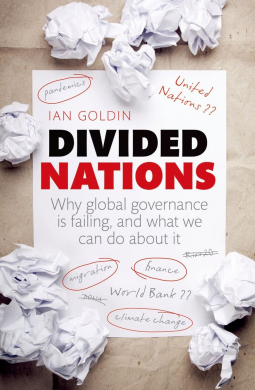
Divided Nations
Why global governance is failing, and what we can do about it
by Ian Goldin
This title was previously available on NetGalley and is now archived.
Buy on Amazon
Buy on BN.com
Buy on Bookshop.org
*This page contains affiliate links, so we may earn a small commission when you make a purchase through links on our site at no additional cost to you.
Send NetGalley books directly to your Kindle or Kindle app
1
To read on a Kindle or Kindle app, please add kindle@netgalley.com as an approved email address to receive files in your Amazon account. Click here for step-by-step instructions.
2
Also find your Kindle email address within your Amazon account, and enter it here.
Pub Date Jun 03 2013 | Archive Date May 12 2013
Description
The UN, World Bank, and the IMF were all created in a post-war world
radically different from today's. It is becoming increasingly apparent
that these global structures are struggling to cope with the challenges
faced by the globalized, interconnected world of the twenty-first
century.
Rapid global integration and urbanization together with game-changing leaps that have globalized technology, communications, mobility, and business, all bring profound advantages, but they also bring systemic risks that are only just being identified and understood. Many of the biggest challenges today's world faces spill over national
boundaries: climate change, finance, pandemics, cyber security, and migration. And the hard truth is that our global governing bodies--created in the 1940s--are simply not up to the task of managing such risks.
As a former Vice President of the World Bank, and head of the multi-disciplinary Oxford Martin School of Oxford University, Ian Goldin is in a superb position to provide new perspectives and approaches to our world order. He explores whether the answer is to reform the existing structures or to consider a new and radical way of tackling inherent failings.
In this groundbreaking work, he sets out the nature of the problems and the various approaches to global governance, highlights the challenges that we are to overcome, and considers a roadmap for the future.
Rapid global integration and urbanization together with game-changing leaps that have globalized technology, communications, mobility, and business, all bring profound advantages, but they also bring systemic risks that are only just being identified and understood. Many of the biggest challenges today's world faces spill over national
boundaries: climate change, finance, pandemics, cyber security, and migration. And the hard truth is that our global governing bodies--created in the 1940s--are simply not up to the task of managing such risks.
As a former Vice President of the World Bank, and head of the multi-disciplinary Oxford Martin School of Oxford University, Ian Goldin is in a superb position to provide new perspectives and approaches to our world order. He explores whether the answer is to reform the existing structures or to consider a new and radical way of tackling inherent failings.
In this groundbreaking work, he sets out the nature of the problems and the various approaches to global governance, highlights the challenges that we are to overcome, and considers a roadmap for the future.
Available Editions
| EDITION | Hardcover |
| ISBN | 9780199693900 |
| PRICE | $21.95 (USD) |



